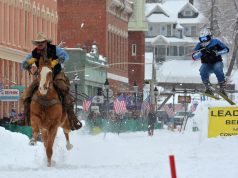
The #MeToo and Black Lives Matter movements exist for the sad but simple reason that sexism and racism are all too alive and well in 2018. Of course, as bad as things are, they could always be worse. Just ask a blind woman smiling wryly as her neighbor complains about having to wear reading glasses.
Take a moment to think long and hard about what it was like to be an African American woman during the bad old days of the first half of the 20th century. Your grandmother might actually have been a slave, and while slavery had been abolished it was still a segregated world. Separate bathrooms, drinking fountains and schools. Businesses of all kinds refusing to serve people of color. Lynchings and cross burnings. A woman’s only place was barefoot and pregnant in a kitchen. The Civil Rights Act of 1964 was still a long way off, not that it was some sort of instant elixir of equality.
Born in 1915 as Eleanora Fagan, Billie Holiday, aka Lady Day, looked around at all of that racist and sexist injustice and gave it a great, big, one-fingered salute. She overcame those societal challenges, in addition to the personal ones of poverty and abuse, to become one of the most seminal singer/songwriters in the history of jazz. Lady Day at Emerson’s Bar and Grill tells Billie’s story, and it tells it with a heady blend of honesty, ferocity and anguish.
At the small but storied jazz club in South Philadelphia, Lady Day (Mary Louise Lee) is deep into her set, her career and her life. It’s March, 1959, a mere four months before Holiday would sing her last. Accompanied on the piano by her longtime bandmate, friend and, of late, nursemaid, Jimmy Powers (Trent Hines), Lady Day alternates telling the tale of her life with singing the songs that made her a legend.
Holiday begins Lady Day seemingly happy and relatively sober. She smiles often as she talks about her mother, nicknamed the Duchess, and croons tunes like “What a Little Moonlight Can Do” and “Pig’s Foot (And a Bottle of Beer.)” Soon enough, though, she’s pounding booze and itching for a fix. You see, for much of her life, Holiday was a heroin addict, a fact that Lady Day unabashedly dramatizes without ever glorifying.
The night slinks on, and Holiday gets louder as she gets more loaded. The audience hears about Holiday’s many trials, both figurative and literal. How she was forced to eat in the kitchens of whites-only restaurants even after she’d become famous. About her struggles with hard drugs and harder men. About being sent to prison for a year and a day on a bogus possession charge. Yet through it all Holiday’s strength and resolve shine through. This is a woman less to be pitied than admired.
A joint production by the Denver Center for the Performing Arts and Aurora’s Vintage Theatre, Lady Day at Emerson’s Bar and Grill owes its resounding success in no small part to its star, Mary Louise Lee. Did Lanie Robertson write an interesting play/musical memorial? Surely. Does director Betty Hart bring all the pieces — blocking, lighting, costumes, performances — together with aplomb? Certainly. Does Mr. Hines both tickle the ivories and play his supporting role like the pro that he is? Absolutely. But it’s Lee transforming into Holiday, metaphorical warts and all, that propels this Lady Day upwards to sublimity.
Watching Lee truly feels like watching Holiday. Her anger, pain and passion are palpable. Playing a drunk well is hard. Credibly playing a junkie on the nod trying to entertain a crowd is damn near impossible. Lee makes Holiday’s progression from sober to stone drunk (and ultimately stoned) as believable as if the water she chugs were really gin and her brief visit “to the doctor” backstage included a spike to a vein. Paired with her acting abilities is Lee’s formidable singing voice. She may not sound terribly much like the singular Lady herself, but her voice is powerful, warm and assured across the more than a dozen numbers that fill the play.
Part biography, part musical tribute, Lady Day at Emerson’s Bar and Grill is all amazing.
On the Bill: Lady Day at Emerson’s
Bar and Grill. Denver Center for the Performing Arts,
1400 Curtis St., Denver. Through April 23.
www.denvercenter.org
$42 and up.














